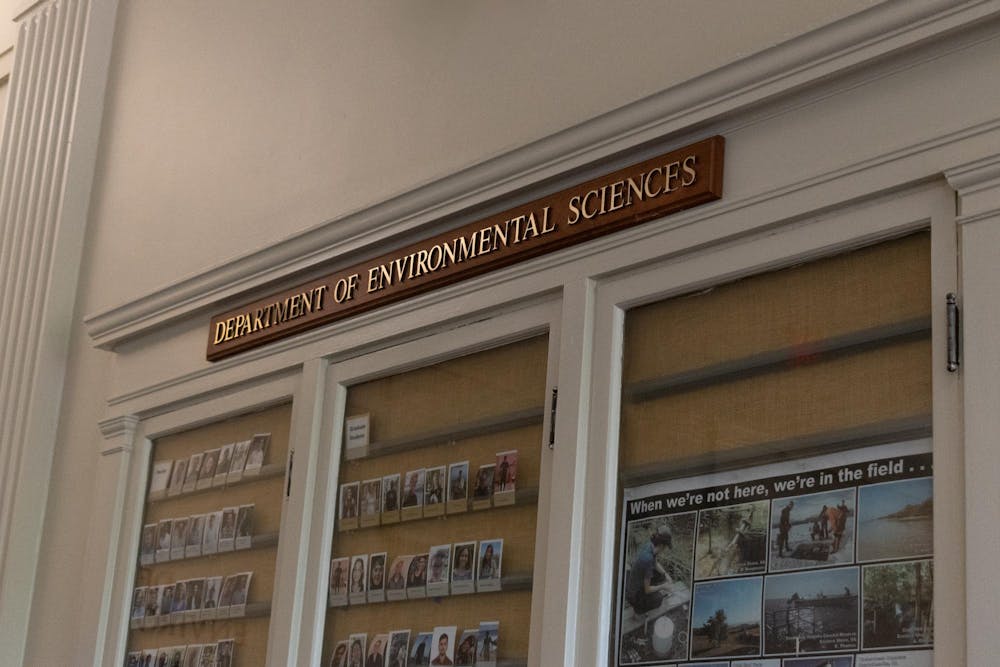The University continues to make strides toward its sustainability commitments outlined in the 2030 Plan — a comprehensive strategic framework proposed by University President Ryan in 2019 to make the University the best public institution in the nation. The University has prioritized environmental resilience and sustainability as part of the 2030 Plan’s goal to reach carbon neutrality by 2030 and fossil fuel-free operations by 2050.
The Office for Sustainability has implemented the 2030 Sustainability Plan to complete 10 major goals centered on sustainability across Grounds and the surrounding community — including carbon neutrality, reducing waste, water and nitrogen and promoting sustainability teaching.
One of the 10 goals is to enhance sustainability research. London Tuma, sustainability student employee at the Office of Sustainability and third-year College student, said she has noticed a drastic increase surrounding sustainable research and practices on Grounds.
“There's been a huge push, at least during my time, to increase this focus on sustainability in research,” Tuma said. “Especially since we're such a research heavy school, I think that it's going to be really impactful work.”
The University announced a $60 million commitment toward environmental resilience research in June 2022, supporting 13 new faculty hires, state-of-the-art equipment, interdisciplinary seed grants and practitioner fellowships. These initiatives, led by the University’s Environmental Institute, aim to deliver cutting-edge solutions to global environmental problems. In 2024, the University reported that more than 280 faculty members were engaged in sustainability-related research following these efforts.
According to University Spokesperson Bethanie Glover, other University efforts include over 600 sustainability-related courses — such as GSVS 3310, “Sustainability Policy at Home & Abroad” and EVSC 2220, “Conservation Ecology: Biodiversity and Beyond” — and more than 300 students actively volunteering in sustainability initiatives, like Zero Waste Ambassadors, which aim to minimize waste around Grounds through composting.
Additionally, 87 buildings on Grounds have achieved LEED certification —- recognized by the U.S. Green Building Council for their energy efficiency and health standards — including the Rotunda, Shannon Library and several dorms and academic buildings. Since 2013, the University has seen a 27 percent reduction in energy use per square foot.
Glover also stated since 2010, the University has cut its greenhouse gas emissions by 45 percent and remains on track to meet its goals. Recent tangible advancements include the arrival of a fleet of electric minibuses set to begin service on Grounds, further reducing the University’s carbon footprint and operational costs.
Leah Germain, sustainability student employee at the Office for Sustainability and fourth-year College student, said she feels optimistic about the University achieving its 2030 sustainability goals because of the work done with University transportation and making new buildings greener. She also said the Office for Sustainability is introducing new programs, such as a summer Decarbonization Academy which focuses on educating students about the sustainability efforts of the 2030 Plan.
“For part of this summer [there is an] intern research thing at U.Va. called the Decarbonization Academy,” Germain said. “They really focus on students in teaching them about the 2030 and 2050 sustainability goals. What are we doing now to try to achieve that? And how can we as students help that ourselves?”
In regards to the implementation of sustainable practices, Tuma said it is visible around Grounds, and she has noticed many sustainable waste disposal efforts, especially through the Green Labs program — an initiative created in 2016 to address and reduce the environmental impact laboratories produce. Widespread University efforts have resulted in a 37 percent reduction in total waste generated since 2010.
Andrea Trimble, director of the Office for Sustainability, highlighted several initiatives already underway, including the Building Energy Efficiency Program and the Sustainable Labs program, both of which aim to reduce energy consumption and utility costs in existing University buildings. Trimble said that future initiatives will continue to focus on engagement, communication and implementation across the University community but did not speak to specific plans.
Germain believes many students at the University do care about sustainability, citing the regular high turnout at the University’s Forest Patches' volunteer events. Forest Patches, a student organization which aims to plan forested areas around Grounds to reduce carbon levels, was established by students participating in the Decarbonization Academy summer program.
“I definitely think that people are super willing to get involved in sustainability events around Grounds,” Germain said.
With efforts underway, Tuma said she is cautiously optimistic about the University reaching carbon neutrality by 2030. While initially believing the goal was achievable, she mentions challenges like reduced federal funding, budget cuts and growing resistance to sustainability initiatives as potential obstacles.
“I do think we're going to have to buckle down if we want to get there.” Tuma said. “Right now we've lost a lot of funding, I mean our office has, but also across the entire school, and I think that sustainability, while people value it a lot, is too often seen as a premium.”
More information about ongoing initiatives and progress can be found in the U.Va. Sustainability Annual Report at the Office for Sustainability’s website. For guidance on proper waste disposal, check the U.Va. Waste Directory.







